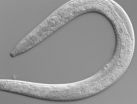Duckweed as a cost-competitive raw material for biofuel production
2013-03-07
(Press-News.org) The search for a less-expensive, sustainable source of biomass, or plant material, for producing gasoline, diesel and jet fuel has led scientists to duckweed, that fast-growing floating plant that turns ponds and lakes green. That's the topic of a report in ACS' journal Industrial & Engineering Chemistry Research.
Christodoulos A. Floudas, Xin Xiao and colleagues explain that duckweed, an aquatic plant that floats on or near the surface of still or slow-moving freshwater, is ideal as a raw material for biofuel production. It grows fast, thrives in wastewater that has no other use, does not impact the food supply and can be harvested more easily than algae and other aquatic plants. However, few studies have been done on the use of duckweed as a raw material for biofuel production.
They describe four scenarios for duckweed refineries that use proven existing technology to produce gasoline, diesel and kerosene. Those technologies include conversion of biomass to a gas; conversion of the gas to methanol, or wood alcohol; and conversion of methanol to gasoline and other fuels. The results show that small-scale duckweed refineries could produce cost-competitive fuel when the price of oil reaches $100 per barrel. Oil would have to cost only about $72 per barrel for larger duckweed refiners to be cost-competitive.
INFORMATION:
The authors acknowledge funding from the National Science Foundation and the Chinese Academy of Sciences.
The American Chemical Society is a nonprofit organization chartered by the U.S. Congress. With more than 163,000 members, ACS is the world's largest scientific society and a global leader in providing access to chemistry-related research through its multiple databases, peer-reviewed journals and scientific conferences. Its main offices are in Washington, D.C., and Columbus, Ohio.
To automatically receive news releases from the American Chemical Society, contact newsroom@acs.org.
Follow us: Twitter Facebook
END
ELSE PRESS RELEASES FROM THIS DATE:
2013-03-07
In a step toward understanding and exploiting an exotic form of matter that has been sparking excitement for potential applications in a new genre of supercomputers, scientists are reporting the first identification of a naturally occurring "topological insulator" (TI). Their report on discovery of the material, retrieved from an abandoned gold mine in the Czech Republic, appears in the ACS journal Nano Letters.
Pascal Gehring and colleagues point out that synthetic TIs, discovered only a decade ago, are regarded as a new horizon in materials science. Unlike conventional ...
2013-03-07
WASHINGTON and NEW YORK—A report released today by the George Washington University School of Public Health and Health Services (SPHHS) and the RCHN Community Health Foundation offers the first-ever in-depth examination of health centers' role in access to family planning. The report finds that virtually all health centers furnish family planning services to some extent but for both financial and non-financial reasons, only 1 in 5 is able to offer access to the full range of contraceptive services.
The report offers a series of recommendations to strengthen performance, ...
2013-03-07
WASHINGTON – Older adults who haven't been in school for a while are as capable of learning from tests as younger adults and college students, according to new research published by the American Psychological Association.
No matter their age or if they work or go to college full time, people appear to learn more when tested on material, rather than simply rereading or restudying information, according to research published online in the APA journal Psychology and Aging.
"The use of testing as a way to learn new information has been thoroughly examined in young students. ...
2013-03-07
São Paolo, March 7, 2013 – In the first gender benchmarking study of its kind, researchers have found that numbers of women in the science, technology and innovation fields are alarmingly low in the world's leading economies, and are actually on the decline in many, including the United States. Results from Brazil show that despite women having a strong representation in parts of the science, technology and innovation sector, and a slight increase in engineering, physics and computer science, overall numbers are on the decline.
Brazil ranks the highest in this study ...
2013-03-07
Climate change could lead to dozens of species of lizards becoming extinct within the next 50 years, according to new research published today.
Globally it has been observed that lizards with viviparous reproduction (retention of embryos within the mother's body) are being threatened by changing weather patterns. A new study suggests that the evolution of this mode of reproduction, which is thought to be a key successful adaptation, could, in fact, be the species' downfall under global warming.
Researchers from the University of Exeter and the University of Lincoln ...
2013-03-07
PHILADELPHIA – It happens to everyone: You stay up late one night to finish an assignment, and the next day, you're exhausted. Humans aren't unique in that; all animals need sleep, and if they don't get it, they must make it up.
The biological term for that pay-the-piper behavior is "sleep homeostasis," and now, thanks to a research team at the Perelman School of Medicine, University of Pennsylvania, one of the molecular players in this process has been identified – at least in nematode round worms.
David Raizen, MD, PhD, assistant professor of Neurology, and his colleagues ...
2013-03-07
Scientists are reporting an advance in re-engineering photosynthesis to transform plants into bio-factories that manufacture high-value ingredients for medicines, fabrics, fuels and other products. They report on the research in the journal ACS Synthetic Biology.
Poul Erik Jensen and colleagues explain that photosynthesis does more than transform carbon dioxide and water into sugar and oxygen and generate energy.
That process also produces a wealth of natural chemical compounds, many of which have potential uses in medicines and other commercial products. However, evolution ...
2013-03-07
Chevy Chase, MD ––Exercise may play a key role in helping children cope with stressful situations, according to a recent study accepted for publication in The Endocrine Society's Journal of Clinical Endocrinology & Metabolism (JCEM).
When they are exposed to everyday stressors, the study found sedentary children had surges of cortisol – a hormone linked to stress. The most active children had little or no increase in their cortisol levels in similar situations.
"The findings suggest physical activity plays a role in mental health by buffering children from the effects ...
2013-03-07
New software, which will allow GP practice managers to improve healthcare for chronic illnesses including strokes, Alzheimer's and cancer, will be unveiled by scientists from The University of Manchester next week (13 & 14 March). Experts have devised a computer programme which analyses how many patients in a practice have suffered from different conditions over a particular time period and identifies those who might require hospital treatment in the future.
Against a back drop of a drive for NHS efficiency savings, they believe the software will help practice managers ...
2013-03-07
Philadelphia, PA, March 7, 2013 – According to a 2012 World Health Organization report, over 35 million people worldwide currently have dementia, a number that is expected to double by 2030 (66 million) and triple by 2050 (115 million). Alzheimer's disease, the most common form of dementia, has no cure and there are currently only a handful of approved treatments that slow, but do not prevent, the progression of symptoms.
New drug development, no matter the disease, is a slow, expensive, and risky process. Thus, innovative techniques to study and assess the possibilities ...
LAST 30 PRESS RELEASES:
[Press-News.org] Duckweed as a cost-competitive raw material for biofuel production

